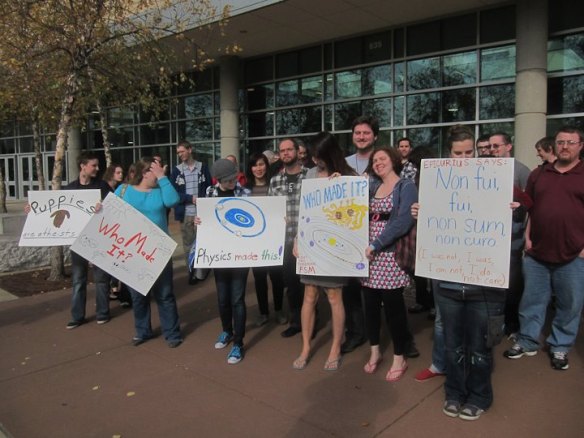(Or, In Which I Rant Lovingly About Skepticon)
I haven’t written for a few days because I was off at Skepticon, which is the largest student-run atheist/skeptical conference in the U.S. It was amazing.
Spending a weekend with a combination of some of my best friends, a few of my greatest Internet Heroes, and a ton of cool people I didn’t know yet got me thinking about the concept of atheist communities–specifically, why we need them.
The idea of an atheist “movement” or atheist “communities” catches a lot of flak for various reasons. Some people are opposed to the idea that atheism should mean anything other than sitting on your butt at home on Sunday morning and not believing in any gods. That’s fine. For many of us, though, atheism informs and inspires what we do with the rest of our lives, and it’s unfair to deny the validity of that.
Others note the toxicity that certain parts of the atheist “movement” have–whether it’s Islamophobia, racism, misogyny, or outright bullying and harassment. Yes, these things happen in our community. But they’re not exclusive to our community. (Of course, I likewise disagree with the apologists who insist that because they’re not exclusive to our community, we should stop making a fuss about them. No, wrong. We should never stop making a fuss about them, because that’s exactly how we get rid of them.)
In other words, claiming that an atheist community is useless or counterproductive because of the nasty elements that it (still) contains misses the point. All communities contain nasty elements. The solution isn’t to disband the communities, but to kick those nasty elements out.
I wouldn’t blame anyone who chooses not to participate in our community because of that, of course. It’s up to you what you’re able and willing to deal with. Personally, I’ve found that the benefits of belonging to this community far outweigh the drawbacks, but that’s just me. And besides, for many years, I was one of those people who called myself “agnostic” (not realizing, of course, that almost all atheists are also agnostics) and shied away from atheist clubs and events. I had my reasons. Now I don’t.
Besides that, people who claim that there’s no point in having an atheist community don’t realize what it’s like to be newly deconverted or living in an area where atheism is heavily stigmatized. I met people at Skepticon who literally can’t be themselves anywhere but there (or on the internet, with pseudonyms). Doesn’t that matter?
Atheist communities can be both productive and fun, when done right. So what was it that was so special about Skepticon?
It was that I walked in and felt like I had come home.
Suddenly I was surrounded by people who really like the fact that I’m always ranting about psychology or social justice or whatever. I had so many interesting discussions all throughout the weekend, in many cases disagreeing with people. Tons of people wore Surly-Ramics (these amazing pieces of ceramic jewelry that an artist named Surly Amy makes to promote science and skepticism), and we compared ours.
For this entire weekend, I didn’t have to apologize for caring. I didn’t have to say, “Sorry I’m being all serious, but…” I didn’t have to say, “I mean, there’s nothing wrong with being religious, it’s just that…” I felt like I was among hundreds of like-minded folks.
Some will say that this makes Skepticon like a “circlejerk” of sorts and that wanting to associate with people who are like you is wrong. I disagree. You don’t typically learn from circlejerks, and I learned a lot. And while it’s a bit immature to always avoid people you disagree with, there’s nothing wrong with escaping to your own “tribe” for a weekend. Constantly having to argue and defend your opinions can be exhausting. For me, Skepticon was like a vacation. An educational one.
Besides, there was plenty of disagreement at Skepticon. It just wasn’t about 1) the nonexistence of god, 2) the value of skepticism, or 3) the fucking awesomeness of science.
There were protesters outside the expo center. They were pretty nice as protesters go. One of them had a sign–I wish I remembered what it said verbatim–and it said something like, “Why such a big fuss over nothing?”
This is one of the biggest myths I hear about atheism, and it’s a myth stemming from the belief that god is all there is to live for. If there’s no god, there must be “nothing.” Nothing worth celebrating, nothing worth getting together for, nothing worth having conferences about, nothing worth getting up at 5 AM to drive 9 hours for. Nothing worth fighting for, nothing worth blogging about, nothing worth dying for. Nothing worth letting your kids stay up past their bedtime so you can teach them about it as they look on in wonder.
The thing is, Skepticon wasn’t just about atheism. Some of the talks were entirely about science and/or skepticism, like the workshop my friend Ben gave about pseudoscience, the talk PZ Myers gave about evolution (which I understood very little of; sorry PZ, you still rock), the talk about the Higgs boson, Rebecca Watson’s amazing talk on how evolutionary psychology is misused to promote sexist bullshit (which had us all squirming in our seats with laughter while simultaneously shaking our heads), and Jennifer Oulette’s talk about positive effects of hallucinogenic drugs and how our outdated national drug policy prevents further research on them.
Why does this matter? It’s not that theists can’t be good scientists or that they can’t promote skepticism and scientific literacy. It’s more that science takes on such an important status in the atheist community that celebrating it is par for the course. Walk into an atheist convention and you’ll see geeky t-shirts and hear references to xkcd and encounter people with PhDs in all sorts of cool scientific fields. My atheist friends and I once hung out over video chat and watched a live stream of Curiosity landing on Mars. When atheists talk about stuff, we’re rarely talking about “nothing” (or, rather, god’s nonexistence). We often talk about science, and science is absolutely worth celebrating.
As for the more explicitly atheism-themed talks, theists might be surprised to know that nobody stood there repeating evidence for god’s nonexistence over and over. Greta Christina talked about how her atheism helped her cope with her father’s death and with cancer. She also mentioned how the atheist community donated so much money in the wake of her diagnosis that she was able to stop worrying about how to afford taking time off from speaking and traveling to recover. Hemant Mehta talked about supporting teenage atheists who are discriminated against in high schools. Darrell Ray discussed how religious ideas about sexuality have permeated even secular discourse, and how we can let go of them and stop feeling shame about our bodies and sex lives.
Oh, and JT Eberhard addressed common Christian arguments against atheism, finishing his talk with “But how do you know love exists?” JT knows love exists because we see evidence for it in how we act with one another, and in how he feels about his girlfriend. And then he proposed to her in front of the whole audience.
These are some of the things we talk about when we get together.
Skepticon is free, and its organizers are committed to keeping it that way. The money for it comes from donations and sponsorships. Just a few days before this year’s Skepticon, the organizers found out that due to an unexpectedly expensive contract, the fundraising had fallen very short. They posted a message asking the community for help.
And we gave them $6,000 in two days.
There is so much work ahead of us in improving our community–making it more accessible, more diverse, more friendly to women, more safe. But even as it is now, it amazes me, and I’m so happy to be here.

The new Surly I got this weekend to remind me to keep doing what’s important.






